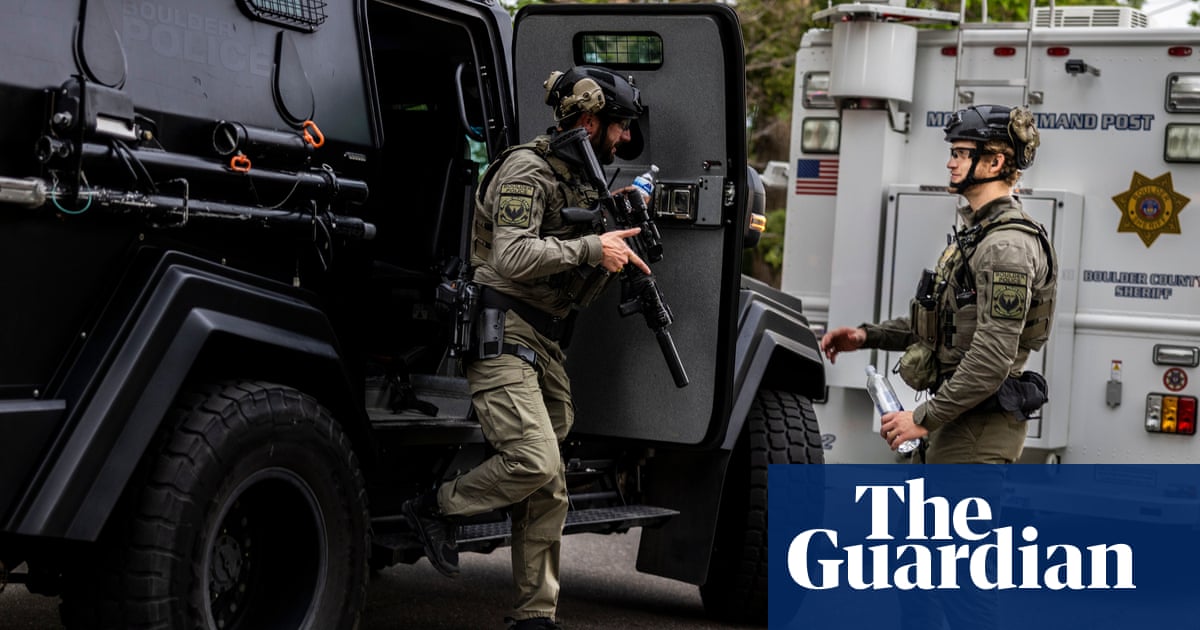Political leaders across the US have condemned what they describe as ahorrific, antisemitic attackin Boulder, Colorado, after a man allegedly used a makeshift flamethrower and incendiary devices to target people at a rallycalling for the release of the hostages held by Hamas.
Mohamed Sabry Soliman, 45, has been charged with multiple felonies after allegedly shouting “Free Palestine” as he attacked the crowd on Sunday. The incident occurred during an event organized by Run for Their Lives, a group that aims to draw attention to people taken hostage following Hamas’s attack on Israel in October 2023.
The FBI is treating the attack as an “act of terrorism”, with Pam Bondi, the attorney general, saying that “FBI agents are on the ground inColoradofollowing what appears to be a horrific antisemitic attack”.
Hakeem Jeffries described the incident as targeting “the Jewish community in America” and called it an “unconscionable act of terror”. The House Democratic leader posted on X: “As residents of Boulder gathered on the eve of the holiday of Shavuot to raise awareness for the hostages still being held captive in Gaza, the peacefulness of their assembly was shattered.”
Many of Colorado’s politicians denounced the attack. Jason Crow, a Democratic representative, characterized the attack as “targeted political violence at the Jewish community meant to spread fear”, adding: “Antisemitism is real. Sadly, it’s on the rise in America.”
Another Colorado representative, Lauren Boebert, linked the attack to broader pro-Palestine rhetoric, saying: “When progressives allow and encourage hate speech toward Jews for their mere existence, people get hurt.” She called for the incident to be investigated “as an act of targeted terrorism”.
Michael Bennet, Colorado’s Democratic senator, said he and his wife were “praying for the victims of today’s horrific antisemitic attack against Coloradans marching peacefully in support of the hostages Hamas has held in Gaza for over 600 days”.
Joe Neguse, a representative of Colorado, said the attack demonstrated how “the scourge of antisemitism has metastasized across our country”, calling for more to “stop this violence”.
The attack took place on the Pearl Street Mall, close to the University of Colorado, on Sunday afternoon. Four women and four men, aged between 52 and 88, were transported to hospitals with injuries ranging from minor to “very serious”, according to Boulder police.
CNN, citing law enforcement officials,reportedthat Soliman arrived in the US in August 2022 as a non-immigrant visitor. It reported that the officials said he was granted a work authorization in March 2023, which expired at the end of March this year, more than two months into Trump’s presidency.
Soliman had previouslyapplied for asylum in the US, CNN reported. He was denied a visa to enter the country in 2005.
Stephen Miller, the White House deputy chief of staff, described Soliman as “an illegal alien” who had been “granted a tourist visa by the Biden administration” before overstaying.
The Boulder attack is the latest in a series of violent incidents in the US since the outset of the Israel-Gaza war. On 21 May, a shooter killedtwo Israeli embassy employeesin Washington after attending an event hosted by the American Jewish Committee. Pro-Palestinian protesters have also been targeted, most notably at UCLA in April 2024 when counter-protesters attacked demonstrators with pepper spray, sticks and fireworks, injuring at least 15-16 people and requiring some hospitalizations. In December 2023, a man fired atthree Palestinian studentswhile they were walking down the street near their university in Vermont and wearing keffiyehs, with two sustaining injuries and one now paralyzed from the waist down.
Officials said there was no indication that Sunday’s attack was associated with any organized group. Soliman has been booked into Boulder county jail and has a hearing scheduled for Monday afternoon.
In their latest annual reports, the Anti-Defamation League says it has tabulated9,354 antisemitic incidentsover the last year, while the Council on American-Islamic Relations says it counted8,658 complaintsin the same span. Both organizations say it is the highest number of incidents in their respective histories.
